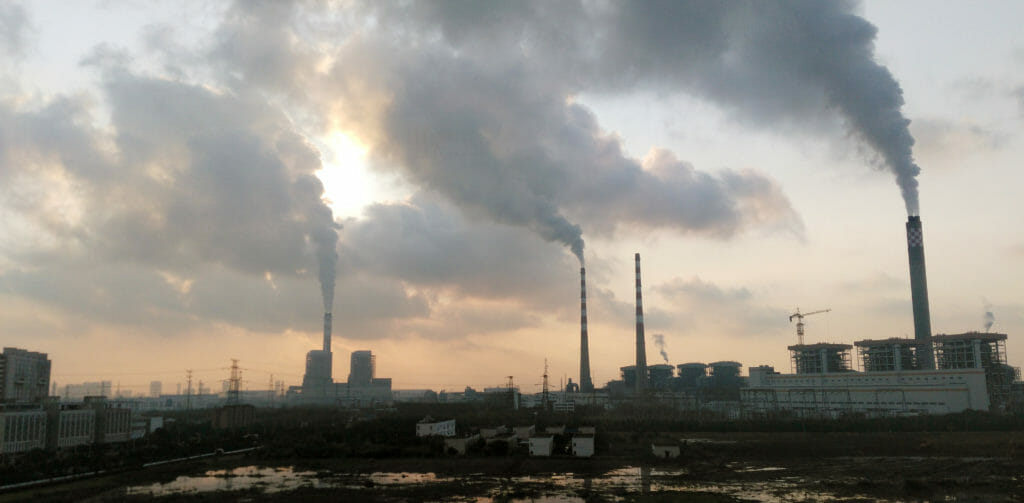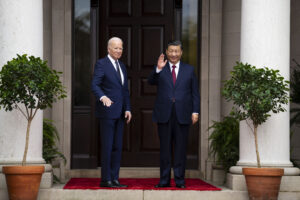China’s Falling Emissions Raise Hopes for Climate
The drop is associated with a move from heavy industry to technical and services enterprises, a decline in the amount of coal used for energy, more efficient energy production and a jump in the use of renewables. China’s carbon dioxide emissions fell by 4.2 percent between 2013 and 2016. (Kristoferb / Wikimedia Commons)
China’s carbon dioxide emissions fell by 4.2 percent between 2013 and 2016. (Kristoferb / Wikimedia Commons)
Say it softly, but a look at China’s falling emissions of carbon dioxide may suggest that there could be some good news on the climate change front.
Over recent years China has supplanted the US as the world’s biggest emitter of climate-changing greenhouse gases, mainly because of the country’s booming economy and its reliance for energy on coal, the most polluting of fossil fuels.
But new data show that China’s emissions fell substantially in the years from 2013 to 2016. The big question now – both for China and for the planet – is whether that downward trend can be maintained.
The data, compiled by a team led by researchers at the University of East Anglia (UEA) in the UK and published in the journal Nature Geoscience, indicate that after nearly two decades of a rapid rise, China’s CO2 emissions fell by 4.2% in the 2013 to 2016 period.
“As the world’s top emitting and manufacturing nation, this reversal is cause for cautious optimism among those seeking to stabilise the Earth’s climate”, says Dabo Guan, professor of climate change economics at UEA.
“Now the important question is whether the decline in Chinese emissions will persist.”
Professor Guan and his colleagues say that the drop in China’s emissions is largely associated with changes in the structure of the economy, with a move from heavy industry to more advanced technical and services enterprises and a decline in the amount of coal used for energy.
More efficient energy production, together with a big jump in the use of renewables such as solar and wind power, have also contributed to the emissions decline.
“We conclude that the decline of Chinese emissions is structural and likely to be sustained if the growing industrial and energy systems transitions continue”, say the study’s authors.
“Government policies are also a sign that the decline in China’s emissions will carry on.”
As part of the 2015 Paris Agreement on climate change, China pledged to peak its emissions of CO2 by 2030. The study finds that this goal has already been achieved, though it cautions that emissions might still rise, with preliminary figures for 2017 showing an increase.
China is still heavily dependent on coal for its energy. Recent government directives call for the use of coal to be limited to four billion tonnes per year, with its share in the country’s energy mix decreasing from 64% in 2015 to 58% in 2020.
Emergent Leader
“In response to the US withdrawal from the Paris Agreement, China has increasingly assumed a leadership role in climate change mitigation, and its five-year progress reports under the agreement will be heavily scrutinised by the rest of the world”, says Professor Dabo Guan.
As part of its programme for reducing emissions, China has set up a number of local and regional carbon market trading schemes in recent years. Later this year these schemes are due to be replaced by a nationwide carbon trading system.
Though China, concerned about chronic air pollution in many of its cities, is seeking to cut its coal use at home, it is investing heavily in coal plants abroad.
Recently China has been particularly active in the Balkans in financing and building coal-fired power plants.
Your support matters…Independent journalism is under threat and overshadowed by heavily funded mainstream media.
You can help level the playing field. Become a member.
Your tax-deductible contribution keeps us digging beneath the headlines to give you thought-provoking, investigative reporting and analysis that unearths what's really happening- without compromise.
Give today to support our courageous, independent journalists.






You need to be a supporter to comment.
There are currently no responses to this article.
Be the first to respond.